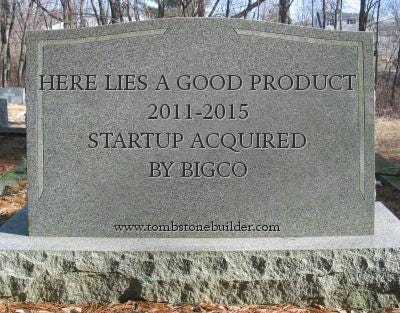Three Unusual Sources of Startup Ideas
I believe that any startup idea, even if it’s an obviously bad one, can be pivoted into a bigger and better idea, so getting started is probably the most important step in making an idea into a successful execution. Sometimes entrepreneurs spend way too much time dwelling on the idea — on a piece of paper, or in the name of the company.
While mentoring TechStars companies over the last five years, I’ve seen what I would consider bad starting points — small markets, bad value prop, high operational cost for low LTV — become billion dollar ideas. Executing them is the hard part, for big or small ideas, for good or bad ideas and that’s where you should focus. To help you find a better idea so you can spend your energy on execution, I’m listing three very unusual sources of idea generation:
The Built-In Apps
Big companies in charge of big platforms have a slower shipping cycle compared with startups. As much as Facebook, Google, Microsoft, Apple or Twitter claim to be entrepreneurial and fast moving, they are not (they were at some point). Steering a very large boat takes time. Here lies the opportunity for entrepreneurs. Anything that’s built into that platform that could be replaced is a great candidate for you to attack. It took Gmail 10 years to update their Contacts experience. iPhone’s calendar app is a joke. Amazon’s AWS cloud resources management took many years to get to an OK point. That gave the opportunity to many entrepreneurs to identify those opportunities and launch alternatives.
But there are more to be done. Each new iOS, Android, Windows, MacOS, AWS, Twitter or Facebook release that exposes new functionality and it has some “built-in” app/service/component, it won’t be updated for a year or two, maybe more. As a startup, you can learn what it does, understand pain points & feedback, and create features that address those problems. Of course you’ll be competing against the “default” app, so many people will tell you to go home. But if you truly create a much better product, people will notice, start using and telling their friends.
Recently Acquired Startups

There are many reasons startups get acquired. Some get acquired for their talent, some for the customer base, some for the underlying technology and some for their revenue. It turns out that revenue is usually the least likely reason a startup is acquired. This presents an interesting dynamic. If a company bought a startup, not because of the prospective value of its business, what’s the buyer incentive to keep the direction of the product as is? Answer: very low.
Most of the acquisitions (guesswork here since I have no real data) lead to the acquired product being shut down in the first two years. Sometimes, pieces of the technology make their way through the main acquirer’s product. But rarely existing users are happy or satisfied with the results, and frequently previous users/customers are upset, angry and venting on social media. You probably had that feeling as well when a product you use often got acquired by a big company, and you just know that you’ll get screwed at some point.
Well, here is the opportunity for you, the entrepreneur. You can’t time the market, but odds are you can be close to timing when a product will decay in value or be shut down after their acquisition. So, the business idea is to start a competitor to product X as soon as X is bought by a big company. By the time your product is hitting the market, your previous bigger competitor will be slowly dying and once their customer revolt you come in as the savior.
Recently Shutdown Startups
Startups fail for reasons far and wide. From poor management to ops cost, from high burning rate to dead ends. Of course, sometimes they die for not finding product-market fit in time and investors or founders decide not to continue the chase. It doesn’t necessarily mean it was a bad idea. It doesn’t even mean there wasn’t a market for it. How many brilliant products go the way of the dodo because the execs didn’t understand a distribution strategy, marketing or customer acquisition?
If I were you, I’d pay special attention to startups that get some traction (press, users, partnerships, etc.) and failed. Or startups that shut down and caused lots of users on Twitter or social media to complain, bitch or whine about it. You are looking for passionate customers left in the rain. This means there is demand, but the supply failed to deliver.
